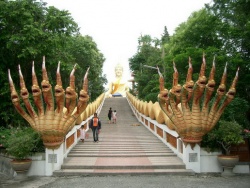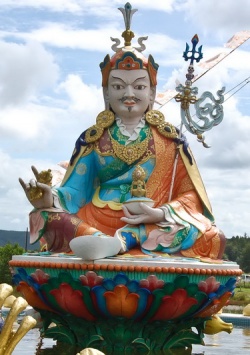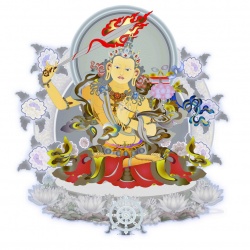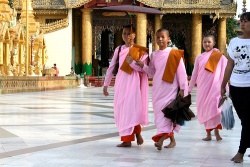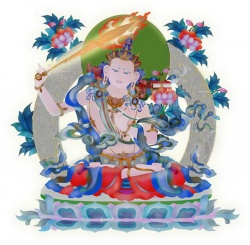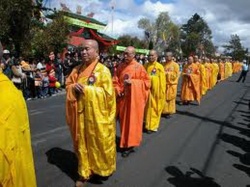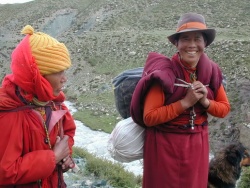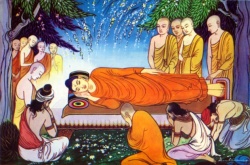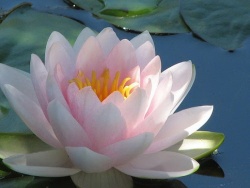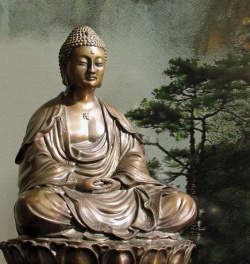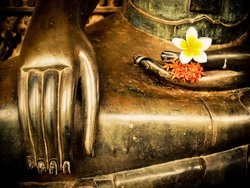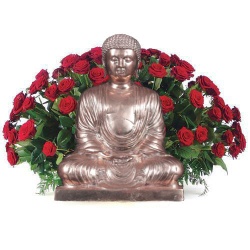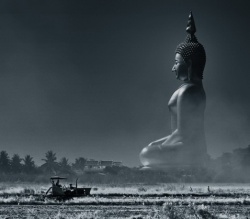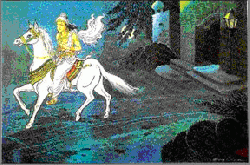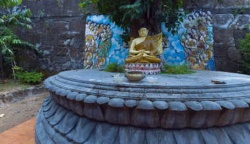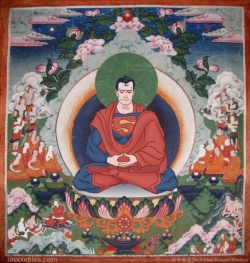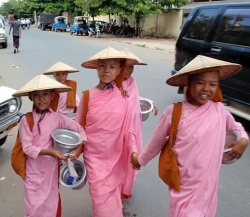The Great Buddha - who was he?
Who was the historical Buddha? Was he ever sad, angry or happy? Did he ever feel helpless? What was he like?
The Great Buddha
(transcription of a Dharma talk by Ven. Hsing Yun)
I believe that all of you seated here today are students of the Buddha. As sons and daughters of our parents, we must know our parents. As students of the Buddha, how can we not know about the Buddha? Some of you in the audience may say, "How is it possible that we do not know about the Buddha? Just look at the statues of the Buddha here." Can we say that we know the Buddha just because we recognize statues of the Buddha? No, we certainly cannot. It is most regretful if we, as students of the Buddha, do not know about the Buddha. There is a verse that aptly describes a common feeling among students of the Buddha in this Dharma Declining Age. It goes like this, "When the Buddha came to this world, I was mired in depravity. Now that the Buddha has gone into parinirvana, I have come into this world. I regret that because of my many hindrances from past karma, I have not been able to see the golden body of the Buddha."
For the last fifty plus years, I have learned a lot about the Buddha. I did much research when I authored the book The Life of Sakyamuni Buddha. Thus one can say that I have a fair amount of knowledge about the Buddha. Today, I want to share with you what I know about the Buddha, and to introduce to all of you the real spirit of the Buddha.
Some of you may think that the Buddha is an almighty immortal with all kinds of powers, who can come and go without a trace. If you think that this is the Buddha I am going to share with you, you will be disappointed. Others may think that the Buddha is full of kindness and compassion, and will grant me whatever I ask for in my prayers. This is not the case, either. I believe that the Buddha most people admire is the Buddha that sits cross-legged on the altar—serene, peaceful, quiet, and still. If the Buddha were to talk and instruct us now, "Do not do this," or "This is not the case," we may not have liked the Buddha as much. Perhaps because the Buddha is not critical of us, does not reproach us, and does not argue with us, we are drawn to him. We willingly pay respect and prostrate to him.
Now, I will try to describe the Buddha with the help of ten questions. I hope, through these questions, we can know the real spirit of the Buddha.
First, did the Buddha ever get angry?
We often get mad; is this also true of the Buddha? Of course, the Buddha certainly did get angry! It is just that the Buddha's "getting upset" is different from ours.
We are incensed when others pick on us or get in our way. When our interests are compromised, we get irritated. This is not the case with the Buddha. The Buddha would not mind if you were not nice to him; however, the Buddha would become angry if you were to mistreat others. Let me illustrate this point with the following episode from the sutra.
Once, the Buddha was traveling with his group of bhiksus to preach the Dharma at some neighboring cities. Among them, some bhiksus were impatient and quick-tempered, while others were of a calmer temperament. On the way, they stopped to rest for the night at a temple. As soon as they settled down, the impatient ones quickly took claim of the available beds. "This is mine!" "That is mine!" In this way, all the available beds were claimed in no time, and Sariputra, the Buddha's leading disciple, was left without a bed. So, he decided to practice walking meditation outdoors. When the Buddha saw Sariputra strolling outside, the Buddha went up to him and asked, "Sariputra, it is quite late now. Why are you not in bed and still wandering in the yard?" Sariputra then related to the Buddha what happened, "We have a lot of bhiksus and there are not enough beds to go around. Some of the new bhiksus wanted to find a bed to retire for the night, so I let them rest first." When the Buddha heard this, he was very angry. He immediately called everyone to a meeting in which the Buddha preached about what respect one should have for one's seniors and elders.
When we do not respect our seniors and elders, the relationship between the seniors and the young is turned upside down and society becomes disorderly. In the past, parents would guide and remind their children, "Why is it that you do not listen to Mom and Dad?" Now, children complain to their parents, "Mom and Dad, how come you do not listen to me?" Even the very young children know how to negotiate for what they want, "If you do not buy this for me, I will not study hard for you!" In the past, students would humbly accept what their teachers had to teach them. Now, it is quite fashionable for students to criticize their teachers, "Teacher so-and-so is not very nice. Every time I make a suggestion, he or she turns it down." In the past, employers would give instructions to employees on what to do. Now, employees make demands of their employers, "The food in the company cafeteria has to improve," or "You have to pay us this much before we can make a living." In the military of the past, officers would give commands for subordinates to follow. Now, subordinates can openly criticize the officers. When there is no standard for our behavior, the fabric of social structure is weakened and social morals cannot be maintained. It is no wonder that disorderliness rules.
The Buddha would get angry with those who were only concerned with their own welfare and had no regard for the hardships of others. The Buddha could also become displeased when a prank, even that of a youngster, ended up hurting others. Let me illustrate with the following example. Before the Buddha renounced his life of a prince, he had a son by the name of Rahula. When Rahula was still a young child, he followed the example of his father and renounced his household life to become a monk. As he was quite young, he was very mischievous and liked to tell little white lies. Once, someone asked Rahula, "Do you know where the Buddha is right now?" Although he knew full well that the Buddha was in the room to his left, he purposely pointed to the right and told the other person, "The Buddha is over there, over there." When the person came back empty-handed, Rahula was very pleased with himself. Later, the Buddha learned of this incident and called Rahula to come before him. When Rahula saw the stern look on the Buddha, he did not dare to say a word. Quietly, he went to fetch a basin of water for the Buddha to wash his feet, hoping that the Buddha would soon start to preach. After the Buddha washed his feet, the Buddha told Rahula, "Take this basin of water and drink it!" Rahula was shocked with what he just heard, and he replied, "Lord Buddha, the water used for washing the feet is very filthy and is not suitable for drinking!"
The Buddha instructed, "When you tell lies, your mouth is as filthy as the dirty water in this basin. Nobody would want you, either!"
Rahula then went to discard the water. Afterwards, the Buddha told him, "Use this basin to hold your food!"
Rahula appeared very troubled and said, "Lord Buddha, this basin that was used for washing the feet is very dirty; I cannot put my food into it!"
The Buddha reproached him, "When your mouth often tell lies, it is just as filthy as this basin. It cannot be used to store anything wholesome."
As soon as he finished, the Buddha gave the basin a kick. The basin rolled noisily for quite a distance and Rahula was frightened. The Buddha asked Rahula, "Are you worried that I may ruin the basin?"
"No, the basin is a cheap basin. If it is broken, I can buy a new one. It does not matter!"
The Buddha again reprimanded Rahula, "Children who tell lies are just like this cheap basin; no one would feel sorry even if it is ruined."
From this incidence, we learn that the Buddha does not put up with those who lie and deceive others. The manner the Buddha used to teach Rahula stems from the high hopes parents have for their children, which is why we say, "When the love is deep, the reprimand is severe." The Buddha's anger is out of compassion, not out of hatred. The love of parents for their children is very much like the love of the Buddha!
Second, did the Buddha ever get sad and cry?
Have you ever thought of the Buddha so saddened that he cried? In reality, there were times when the Buddha was saddened and there were also times that the Buddha cried.
Mara (the evil one) once told the Buddha, "We do not like the way people have accepted the Dharma; from now on, we will fight with you every step of the way!"
Unperturbed, the Buddha replied, "I am not afraid of your sabotage."
"Everywhere we go, we will criticize you, slander you."
The Buddha said calmly, "I am not afraid!"
"We will use clubs, knives, and guns to strike at you!"
"Clubs, knives, and guns—they do not frighten me!"
After this exchange, Mara thought to himself, "The Buddha is not afraid of anything." He then called out, "Then we will become your disciples. We will wear the monastic robes, eat monastic food, but we will not walk the Buddhist Path. When you talk about the three cultivation practices of precepts, concentration, and wisdom, we will practice the three defilements of greed, hatred, and delusion. We will be diametrically opposed to the Buddhist Dharma; in this way, we will undermine you."
At this point, the Buddha thought about the tragedies sentient beings of the Dharma Declining Age had to confront. He was moved to tears; finally the Buddha cried.
This is what is meant by the saying, "The worm not only lives on the body of the lion, it even feeds on its flesh." Today, there are many people who claim to be the disciples of the Buddha: they carry the Buddha's banner and wear monastic robes, yet they are a disgrace to the good name of Buddhism. How is it possible that the Buddha is not heavyhearted? When children do not turn out well, parents are pained and the family suffers. Similarly, when his followers turn against him, the Buddha becomes sad and tearful.
One way to handle these Buddhist imposters within the Sangha is to give them the silent treatment and not to pay any attention to them. This, however, is a passive response. Also, imposters outside of the Sangha are much harder to control. Thus, within the gates of Buddhism, it is important to implement sound organizational structures, education, and training as a means to maintain the integrity of the Sangha.
Third, were there any moments of joy for the Buddha?
Most definitely. The Buddha lived in happiness and joy. There are two aspects to the Buddha's daily living in this world: for the benefit of self and for the benefit of others.
Let me try to explain this simply. What we spend on our own clothing, food, housing, and transportation is for our own benefit. What we spend on charity to help those in need is for the benefit of others. In the case of the Buddha, the Dharma joy of the Truth and the serenity of Ch'an meditation was for the benefit of self. The Buddha's preaching, his compassion, his majestic aura, and everything that he did for sentient beings were for the benefit of others. As students of Buddhism, each of us should learn how to apply Buddhism. We should understand which aspects of Buddhism are for the benefit of self and which are for the benefit of others. Paying respect to the Buddha, chanting, sitting meditation, practicing patience, applying the right effort, and observing the precepts are for the benefit of self. When we are complimentary of others, help others, come to the aid of those in need, act compassionately, give alms, and build good causal relationships with others, we are practicing Buddhism for the benefit of others.
The fifteenth day of the seven lunar month is the Ullambana Day; it is also called the Sangha Day. On this day, the ever-present joy of the Buddha is most special, so this day is also called The Buddha's Joyous Day. Why was the Buddha especially joyous on this particular day? During the time of the Buddha, all the bhiksus would begin their summer retreat from the fifteenth day of the fourth lunar month. On the fifteenth day of the seventh lunar month, they had realized intense cultivation during the retreat. Devotees often would make offerings to the Sangha on this occasion. The resulting merits then could be dedicated such that ancestors of devotees might share the blessings of the bhiksus' cultivation. It was truly a joyous occasion for both the human and celestial realms! As a result, the Buddha was especially joyous.
The reason I want to bring this up is to emphasize that we should understand the Dharma. Buddhism is a religion that promotes happiness, and we should constantly try to develop a joyous character. Some people always look depressed and melancholic¾ before long, their whole lives disappear in the midst of sadness and grief. This is most unfortunate! There is a saying, "A face showing no anger is a true offering; a mouth speaking no anger emits wonderful fragrance. A heart with no anger is a priceless treasure. Truth as such is eternal and never destroyed." Not only should we learn to arrest our anger and not speak of it or show it in our face, we should learn not to have anger arise. This way, our hearts will not harbor any anger; peace and happiness will show through our face, and everything will turn out nicely.
We all have to remember that it does not matter if we do not have anything tangible to offer to others. What is most important is to offer happiness to others. Our days may be filled with problems and headaches, but when we sleep, we should leave them behind and not bring them to bed with us. When we eat, we should eat our meals happily rather being consumed by own sorrows. We should not carry our unhappiness with us from one day to the next, and we should not constantly display our sadness to wear people down. Look at me, although I have quite a few students and devotees, they never come to me when they are happy. They seek me out only when they have problems and headaches. I ask them jokingly sometimes, "When I see all of you, I express my joy and share happy words with you everyday. Why does it seem that you only give me your problems and headaches? Sometimes it becomes unbearable for me to see worried faces all the time. How about if we do it differently and you share your happiness rather than your sorrows with me? Does this sound good to you?"
I have always maintained that we should greet others with three pleasantries, such as "You look great!" or "This is a nice day!" or "Have a good day!" In other words, when we greet others with three pleasantries, we can make others feel good and glad.
Some people are very stingy with their words; this is why we promote that we greet others with three pleasantries. But, when we fight, we should stop after one round of exchange. Let me give you this example. A wife slaves over the stove to prepare dinner for her husband. She sets the table and tells her husband, "It is dinnertime." The husband becomes annoyed and replied, "Alright, alright. Wait a minute!"
This is one round of exchange, and the wife should stop at this point. If the wife continues another round of exchange, "Every time I call you, it is always ‘Alright, alright.' How many times do you want to be called before you will come!"
The husband now becomes really irritated and retorts, "Don't you see how busy I am?"
The wife gets even by saying, "Busy, busy! You are always busy. Don't you have a clue that I am busy too?"
In this way, after two or three rounds of heated exchange, a fight erupts. So, please remember, when we fight, we should stop after one round of exchange. In the old days, duels were often settled after one round. If the conflict were to continue, there would be no end to it! If we keep fighting, how can we lead a happy life?
We, as Buddhists, should learn from the Buddha and give others happiness. As members of Fo Guang Shan, we should learn the real spirit of the Buddha. We, as Fo Guang Buddhists, should abide by the following four objectives: to give others confidence, to give others happiness, to give others convenience, and to give others hope.
Fourth, was there any enjoyment in the Buddha's life?
We all hope that we can enjoy life a little bit more. Even coming to this Dharma talk, we want to have a good seat where we can sit comfortably, or hope that the room is air-conditioned and the floor is carpeted, and the list goes on. This is enjoyment for our daily living. People pursue fame and wealth to improve their living condition, so that they can enjoy life a little bit more. In actuality, fame and wealth can bring forth its own set of problems. Is that enjoyment? Not necessarily so. The enjoyment of our senses is very limited. The eyes crave to see pleasing sights, the ears crave to hear delightful sounds, and the body craves the feel of soft and luxurious clothes. But when these sensations pass, we soon feel empty and lonely again. This is no different from when a party ends, dirty dishes and trash are left behind. The price to pay for worldly fame and wealth is just enormous. When we are controlled by the external environment, we cannot find inner peace. If we are not affected by what we see and hear, then there is nothing to bind us. The Dharma joy within ourselves will begin to flow; this will bring us lasting enjoyment.
Among the Buddha's disciples was the former Prince Bhadrika. Once, while he was doing sitting meditation with the other bhiksus, he suddenly called out, "This is happiness, happiness!" As it turned out, the Buddha passed by, so he asked, "Someone just yelled out happiness. What is the happiness? Why did he scream happiness?" Bhadrika replied, "In the past when I was still living in the palace, I was constantly surrounded by guards, yet I was afraid that others would harm and assassinate me. In the palace, the food is of the best quality and the bed is very comfortable, yet I did not enjoy the food and my sleep was not sound. Now that I have renounced the secular life, I can cultivate in the remote hills and woods. Now that I feel free, I am not afraid of anything. I find the simple vegetables and carrots that I get from the alms round extremely tasty. When I sit here to meditate, I just feel cleansed and without any worries. I enjoy the path of cultivation so much that I cannot control myself and must cry out with elation!" Is this not another form of enjoyment?
What is the happiness that the Buddha enjoys? It is the happiness of nirvana. The happiness of nirvana has four special characteristics: eternity, bliss, true nature, and purity. His happiness was to feel the duration of life, to feel the natural joy of life; to feel the existence of life, and to feel the simplicity of life. Now, a lot of people are so busy that they have forgotten about themselves. When they have lost touch with themselves, they have also lost touch with happiness.
Serene happiness is a characteristic of nirvana. If we understand Buddhism, we would know that we can easily find serene happiness in our daily lives as well. We always say, "Helping others is a source of happiness," "To be content is to be happy," and "With patience, comes peace." We can enjoy happiness in contentment. We can even find happiness when we are truly remorseful. We can also find happiness when we are respectful of others, when we have faith, and when we remain calm and peaceful. We should not try to find happiness from our senses; the source of happiness lies within our hearts. When we find ourselves, our own hearts, then we will find happiness. There is happiness in reciting the Buddha's name, in meditation, and in paying respect to the Buddha. Sometime, when you do sitting meditation, you will discover that all your thoughts are calm and not a desire is in sight; you want to stay in this peaceful Dharma joy forever. Is this not happiness? Or, we can be proactive in aiding those in need and helping to repair roads and bridges, then we can also enjoy happiness. When we build good causal relationships with others, we will find support from all sides and we will be naturally happy.
Buddhism of the past had a tendency to equate cultivation with asceticism. Actually, this is quite misleading. Buddhism is a religion of happiness; it does not dictate suffering to its devotees. When it talks about "suffering," it is telling us that suffering abounds in life and that it is a phase that we have to go through to reach happiness. A butterfly has to come out of its cocoon before it can fly. A tree trunk has to be sawed before it can be of any use. In Buddhism, we have to cross the sea of suffering before we can reach liberation. When others reprimand us, criticize us, or even slander us, we should not get angry but should thank others for giving us the opportunity to clear some bad karma from the past. When others defraud us of our hard-earned money, in the absence of an understanding of the Dharma, we would become very frustrated; however, if we practice the Dharma, we will look at the situation as a way to pay off some old debt. Being without debt and without worries, is this not a cause for happiness? In this way, we can even find happiness under adversities. Like the Buddha, we would be able to enjoy the serene happiness of nirvana.
In this world, we are happy when good things happen. When we have the Dharma, we will be able to handle misfortunes and disappointments with equal ease. As in the saying, "When the mind is pure, the land is pure," we can use our pure and calm mind to transform the world. Grief is bodhi, and affliction is happiness. If your mom and dad are very strict, you need not be distressed. You should think to yourself, "It is good that my parents are stern with me; they help me stay away from trouble." With every situation in this world, as long as we can change our perspectives, we will find happiness always!
Let me share with you a secret that few of you know. For many years now, unless I am dining with guests, I always eat my dinner standing up. Usually there is not a chair in my living quarters, so I just eat my meals standing up. I doubt if any of you knew. I lead a very simple life, and I do not enjoy my meals any less.
The life of the Buddha might have been very simple and fraught with hardships, but in the vast wisdom of the Buddha, he always enjoyed the wondrous wisdom of nirvana.
Fifth, did the Buddha have affection?
Do you think that the Buddha had affection? We Buddhists like to deify the Buddha and claim that the Buddha was different from other human beings. Because affection can be tainted and can bring us afflictions, we prefer to think that the Buddha did not have affection. No, this is not so. The Buddha was rich in affection! The Buddha's affection, however, was to love all sentient beings equally. The Buddha's affection was the kindness and compassion that was described in the saying, "Great kindness without conditions, great compassion as we all are one." A step above love is kindness and compassion, and above kindness and compassion is "Great kindness without conditions; great compassion as we all are one." It is difficult for us to understand the love and affection of the Buddha.
What is meant by "great kindness without conditions"? If we examine our kindness, we will notice that our kindness is limited. We are kind toward those we have a relationship: you are my neighbor, my classmate, my colleague, or my relative. This type of kindness is conditional. The kindness of the Buddha is to give happiness to all without conditions. When we can help a total stranger that we have never met in our entire life, when we can help just because the person needs our help, and when we can help without any strings attached, then we are practicing "great kindness without conditions."
What is meant by "great compassion as we all are one"? It means that I feel your pain as if it is my pain, and I want to relieve your pain as much as I want to relieve my own pain. Often our compassion is limited to giving once or twice, and we get tired if we are called upon time and time again. The Buddha's compassion and kindness is not like this at all. Let me illustrate the point with this example. Suppose my hand has an infected wound with a repulsive stench. Because the hand is part of my body, I will take very good care of it. I will not get tired of it, but will instead clean up the infection and dress the wound. When we can treat all sentient beings with the thought, "We are all related; he is like part of my limb," then we have the compassion to treat others like ourselves. This is "great compassion as we all are one." To practice "great kindness without conditions, great compassion as we all are one," we should do a little role reversal. If we can put ourselves in their shoes and project ourselves into their situation, then the spirit to practice "great kindness without conditions, great compassion as we all are one" will begin to bloom within us.
Let me give you another example. Does any of you ever have athlete's foot? Although athlete's foot can give off a really offensive smell, some people still like to give it a good scratch and may even put their fingers to the nose afterwards. Why? This is because the foot, though smelly, is one's own foot and in which case even the stench may seem pleasant. Thus, if we can treat all sentient beings as ourselves, how can there be any complaints?
The Buddha went to the Trayastrimsas Heaven to preach the Dharma to his mother, and he was the pallbearer at his father's funeral. Do you think the Buddha was sentimental? While I was writing The Story of Sakyamuni Buddha, I was most impressed by the way the Buddha showed his sentiments—purely, immaculately, and without leaving behind a trace.
The second year after the Buddha attained his enlightenment, he returned home to preach to his father and brothers. Princess Yasodhara, the Buddha's wife before he renounced his household life, waited impatiently to see the Buddha. What took him so long? After a prolonged wait, the Buddha finally arrived. Princess Yasodhara thought to herself, "When I see him, I really have to give him a good piece of my mind for being such an ungrateful and heartless person." When she finally saw the Buddha, she was moved by the compassionate and majestic aura of the Buddha and immediately fell to her knees. When I reached this point in my writing of this book, I wondered to myself: What should the Buddha do? At this time, the Buddha was a completely enlightened individual; he was then not an ordinary person and was no longer the husband of Princess Yasodhara. What was the Buddha to say to Princess Yasodhara? The great Buddha was most remarkable. He looked at Princess Yasodhara and said to her, "Yasodhara, I apologize to you, but you should be happy for me. I live up to my responsibility to all sentient beings. I have attained Buddhahood; I am now the Buddha." With these words, the Buddha managed to put Yasodhara at ease, yet conveyed the standpoint of the fully enlightened one. For most of us, although we may have the aspiration to cultivate, it is difficult for us to achieve perfection in both compassion and wisdom.
As I had not seen my mother for a few decades, I really hoped I could reunite with her in Japan. When the opportunity finally came, I waited for her arrival at the airport in Japan. When I spotted her at a distance, I wondered, "Is that really mother?" As she drew close, the emotions of reuniting with her son after so many years finally hit home, and tears began to well up in her eyes. So I said to her, "Do not cry here. Come with me!" I could almost see her trying to pull her tears back into her eyes. My intention was this: Before we cry, we should at least consider where we are. No matter what kinds of emotions and sentiments we experience, we should not be consumed by them. We need to manage our emotions and sentiments so that they will not become out of control.
The Buddha is rich in affection. He served his sick disciples tea and water; he threaded needles to help his older disciples to mend their clothing. This pure affection is what is meant by "compassion" in Buddhism.
Sixth, would the Buddha lie?
Would the Buddha lie? This is indeed a very serious question. How do we dare to say that the Buddha would lie? The Five Precepts of abstaining from killing, stealing, sexual misconduct, false speech, and intoxicants are very important precepts. Lying is a form of false speech! How could the Buddha lie? This is because the Dharma is dynamic. If the acts of killing, stealing, sexual misconduct, false speech, and taking intoxicants are committed out of greed, hatred, and delusions, they are indeed very severe violations of these important precepts. If the violations are performed out of compassion, then they constitute another form of the Bodhisattva Way. Take the example of a sociopath who, wielding knives and guns, is on a rampage to kill many innocent people. What are we supposed to do? Do we just stand by and watch him destroy the lives of innocent people? Of course not. Sometimes, out of compassion to save the many innocent victims, we may have to first kill the sociopath. This is markedly different from killing someone out of hatred. Let us say that I found out you were plotting to gun down another person, or try to do harm with poison, and I tried to conceal the gun or the poison. Would you say that as this involves stealing, that I should not try to conceal the weapon and just let him commit the murder? Under these circumstances, the Buddha would use his wisdom to handle the situations in special ways.
Once while the Buddha was meditating in the woods, it happened that a rabbit was shot by a hunter. The rabbit ran to the Buddha and hid under his robe. The hunter who was chasing the rabbit stopped to ask the Buddha, "Did you see my rabbit?"
Of course, the Buddha saw the rabbit, but he could not tell the hunter where the rabbit was. So, the Buddha replied, "No, I haven't seen the rabbit."
Is this a lie?
"You have hid my rabbit, my dinner for the night. Can you please return it to me?"
"Oh, it was for your dinner tonight!" The Buddha then pulled the knife he had with him, and he asked the hunter, "If I cut off my arm, is it enough to compensate you for the rabbit? Let me give you my arm for your dinner!"
In order to save sentient beings, the Buddha told a fib out of great, fearless compassion. This is not an everyday lie. This is in accordance with what is said in the Diamond Sutra, "The Tathagata is one who speaks of things as they are, as what is true, and as in accordance with reality."
Once when the Buddha was cultivating his practice in a past life as a bodhisattva, he chanced to run into a bandit who was about to rob and kill five hundred merchants passing by. When the Buddha found this out, he killed the bandit without any hesitation. In the mind of the Buddha, he would rather accept the bad karma of taking a life than letting five hundred innocent people lose their lives. The Buddha would not lie to deceive others, but the Buddha also would weigh the different sides of the issue before acting accordingly.
Seventh, did the Buddha have a job?
Do you think the Buddha had a job? Yes, he did. How do we know? Once the Buddha went to Devadaha for his alms round. The king of the city was King Suprabuddha, the Buddha's father-in-law before he renounced his household life. When the King saw the Buddha, he was furious and had these words for the Buddha, "You are a person who has forsaken your own country and wife. Your life does not serve any purpose, and you are of no benefit to the world. You do not have a job and do not produce anything useful. I forbid you to do alms rounds in my country." How did the Buddha respond? He replied, "King Suprabuddha, you are mistaken. Everyday, I use the plough of compassion to till sentient beings' field of blessings. The seeds I sow are bodhi seeds. I work hard like this everyday; how can you say that I do not do anything productive?" As started from the Buddha, the job for teachers of Buddhism¾ the Buddha's bhiksus and bhiksunis¾ is to cultivate the practice and preach the Dharma. With their compassion and cultivation, they serve to elevate the moral standards of society and purify social trends. Is this not work?
When King Ajatasatru was about to attack Vrji, the Buddha resolved the conflict and the war was averted. When Kapilavastu was attacked by King Virudhaka, the Buddha initiated a movement to protect his country. The Buddha helped to build family harmony when he was instrumental in getting the disrespectful daughter-in-law of Elder Sudatta to mend her ways. The Buddha also guided Matanga to turn over a new leaf and advised Angulimala not to kill. The Buddha has enlightened the wisdom of millions of people to know themselves and to gain deliverance. His work is most holy and significant!
Eighth, did the Buddha have to deal with any adversities?
In this world, we have to constantly deal with hardships and distress. Do we know if the Buddha also had to deal with any adversities? As the Buddha was reborn into this world, and since no one can totally escape all adversities in this world of ours, the Buddha was no different. Just take the examples of aging, sickness, death, and suffering¾ who can be free of them? The Buddha had to deal with adversities on ten different occasions. When he was cultivating, he survived on a sesame seed and a grain of wheat a day. This was a form of hardship. During years of famine, everyone was impoverished and hungry. When the Buddha went around for his alms round, he could only find remains of horse feed to fill his hunger. Although the Buddha accepted the predicament, this was still a form of hardship. Devadatta attempted to assassinate the Buddha on several occasions. Once he wanted to crush the Buddha and hired someone to push a huge boulder from atop a hill to where the Buddha was sitting. At another time, he let a drunken elephant charge at the Buddha. The Buddha, of course, was not hurt; but these were adversities nonetheless. Devadatta once wanted to start a fight with the Buddha. When the disciples of the Buddha learned of the plot, they quickly readied themselves with sticks and clubs to protect the Buddha. After the Buddha heard what happened, he laughed and told Ananda, "Does one who has become the Buddha still need others to use sticks and clubs to protect him?" Before Uruvilva-Kasyapa took refuge in the Buddha, he tried to harm the Buddha with a poisonous snake. The snake became still as soon as it saw the Buddha. When Angulimala came to assassinate the Buddha, he fell to his knees and surrendered his weapons when he saw the Buddha. Like everyone, the Buddha had to deal with adversities, but the Buddha used his magnanimity and virtues to overcome them. He did not have to rely on sticks and clubs to protect himself.
According to the Fo Shuo Hsing Ch'i Hsing Sutra (the sutra that describes the causes and conditions of the ten adversities of the Buddha), the Buddha endured the following ten different adversities during his life.
The Buddha was slandered by Sundari.
The Buddha suffered from headaches.
The Buddha suffered from joint pain.
The Buddha suffered from backaches.
The Buddha's feet were injured by a wooden spear.
The Buddha bled when injured by rocks tossed at him.
The Buddha was slandered by Cinca-manavika.
The Buddha lived on remains of horse feed.
The Buddha practiced asceticism.
The Buddha was slandered by Shemipa.
These ten different adversities were the residual karma of the Buddha's past lives. In the Fo Shuo Hsing Ch'i Hsing Sutra, the Buddha says that even when one becomes the Buddha, when one has eradicated all evils and practiced all virtuous acts, one still has to live through the consequences of whatever residual karma one has. To a great holy person, these adversities have no impact. It is like the rainstorm that once it is passed, the clear blue sky will again appear!
Ninth, was the Buddha ever slandered by others?
Was the Buddha ever slandered by others? Most definitely. Some of these slanders are mentioned in the last section; the Buddha faces slander even now. As is the case of any great person, to those who believe in him, he is a deity, a holy person, or a Buddha. To those who do not believe in him, he is a demon, a sinner, or a charlatan. There is a chasm of difference in perspectives between those who believe and those who do not. Thus, it is inevitable that there will be slanderous remarks coming from those who do not believe.
During the time of the Buddha, when someone renounced household life to join the Sangha, others might criticize the Buddha, "You took our sons and daughters from us." "You took my husband (or wife) from our family. Our family is now all torn up." "This Buddha does not have any regard for families, parents, spouses, and children. What good is he?" These types of remarks were inevitable. This was especially true when Buddhism began to take root and Buddhist followers multiplied in numbers, at the expense of other religions. There were ill feelings among the other religions, which led to the following incident. A follower of another religion retained a lady-for-hire to make a false accusation at the Buddha. While the Buddha was preaching, she stood up with her abdomen protruding and raised her voice at the Buddha, "Sakyamuni, though you talk a good game when you preach the Dharma, what are you going to do with your baby in my tummy?" The Buddha was the father of her child!? There was quite a stir among the audience. How would the Buddha respond? The Buddha did not say a word. Among his disciples, Maudgalyayana was the foremost in supernormal powers. Upon examination, he realized that the protruding stomach of the woman was nothing more than a basin tied to her waist. Using his supernormal powers, Maudgalyayana severed the ropes holding the basin, which dropped and rolled around the floor. The Buddha continued his silence toward the woman and kept on preaching the Dharma.
During the Buddha's lifetime, he preached the Dharma for forty-nine years and gave over three hundred Dharma talks. Because of us, he shouldered a lot of hardships and numerous slanders. He brought us limitless Dharma joy and boundless truth. We, sentient beings, are really indebted to the Buddha. But in this world, how is there light without darkness? How do we see the beauty of virtue without the ugliness of vice? Without mud and dirt, how can the pure lotus bloom?
Tenth, did the Buddha feel helpless?
We like to think that the Buddha is full of supernatural powers and can do everything. In reality, the Buddha could feel helpless, too.
Once there was a man named Kantatuo; he was rotten to the core and did many horrible things while he was alive. He was, however, kind on one occasion. One day, while he was walking, he saw a spider and was about to step on the spider when it occurred to him that his step would no doubt kill the spider. At that time, a thought of kindness overcame him and he retracted his step. He finally stepped over the spider and spared the spider's life. After Kantatuo died, he fell into the depths of hell. The spider, in the meantime, wanted to repay Kantatuo for his kindness. When the Buddha learned of the spider's intention, he helped the spider drop its spider thread all the way into hell so that Kantauto could use the thread to climb out of hell. When all the beings suffering in hell saw the spider thread, they pushed and shoved trying to grab the spider thread. At this time, hatred arose in Kantatuo's mind. He pushed everyone aside and said, "Go away, this is my spider thread. Only I can use it to climb out of here. Go away, go away!" As he grabbed the spider thread, he applied too much force and the thread was broken. Kantatuo, together with all the others, fell down again. The Buddha, who saw the whole thing happen, sighed and said, "Oh, sentient beings are so selfish. There is nothing I can do."
If we are selfish, hateful, unwilling to share any benefits with others, if we are not compassionate toward others, do not form good causal relationships with others, then even the Buddha cannot help us to save ourselves!
Once there was a young man climbing a mountain. Halfway up, he lost his footing and fell down the side of the mountain. Luckily, he managed to grab a vine growing on the side of the mountain. As he looked, he realized there was no solid ground for many feet beneath him, and above him was a steep cliff. Out of panic, he called out, "Lord Buddha, Lord Buddha, please come and save me!"
The Buddha indeed appeared to save him from his predicament. The Buddha said to him, "Young man, I do want to save you, but I am afraid that you would not listen to me."
The young man said, "At this moment, why would I not listen to you?"
"Really? Are you going to do exactly what I tell you, regardless what it is?"
The young man was very compliant, and he said, "Lord Buddha, I will most definitely follow your teaching!"
Immediately, the Buddha said to the young man in a serious tone of voice, "That is good. I want you to let go of what you are holding."
"Oh, no!" the young man replied in shock. He continued, "Do you want me to let go with my hands? If I do that, won't I fall to my death?"
The Buddha let out a sigh and said, "You do not want to let go of your hands and cannot let go. How can I save you?"
In this world, whether we can be saved or not depends on whether we can see through all phenomena, and whether we can rise to the occasion and let go. If we want the Buddha to help us save ourselves, we have to let go of some of the shackles within our everyday lives before we can enter into the liberated world of the Buddha.
In our discussion today of "The Great Buddha," I am afraid I did not do justice to the subject matter. I have not addressed the enlightened Dharma of the Buddha, nor have I covered the compassion and wisdom of the Buddha. Instead, our discussion revolves around the mundane aspect of the Buddha's everyday life, his headaches, and his frustrations. I hope all of you know that I promote Humanistic Buddhism, which is why I want to portray the Buddha in human terms. We have to build our faith upon the understanding of the Buddha who lived on this earth; from the faith of this understanding we can slowly rise up to know the Dharmakaya, the embodiment of the prajna wisdom, and the real Buddha. It is not unlike one who has to start from elementary school, and then proceed to high school before one can enroll in college. The virtues and accomplishments of the Buddha are vast and limitless; they cannot be comprehended with a momentary deliberation or viewed with a single glance. They have to be understood in many gradual steps.
When we can understand the Buddha who lived among us, then we can begin to get to know the Buddha who lives within our hearts. When we comprehend the Buddha who lives within our hearts, then we can, all of a sudden, perceive the Dharma of the Buddha.
My students often say to me, "Master, you have not chatted with us for quite some time; our faith begins to falter." Inevitably, I would tell them, "I have studied Buddhism for fifty plus years, and the Buddha has never spoken to me. My faith remains strong, and I try my utmost to spread the truth of the Dharma. I know that the Buddha lives within my heart, and he is with us everyday. What is the need to discourse with me?"
